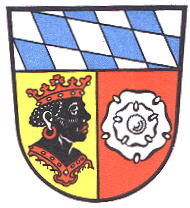Freising (kreis)
| Heraldry of the World Civic heraldry of Germany - Deutsche Wappen (Gemeindewappen/Kreiswappen) |
FREISING (FS)
State : Bayern
Origin/meaning
The arms were granted on August 21, 1955 and confirmed on July 15, 1976.
The upper part of the arms show part of the arms of Bavaria (Bayern), and stand for the former areas of Kranzberg and Moosburg in the district.
The moor's head is a false representation of St. Corbinianus, the patron saint of the diocese of Freising. St. Corbinianus was bishop of Munich in the 7th century. The picture is derived from pre-heraldic coins and it is unlikely that the bishop was a Moor. The State of Freising (it was a free state ruled by the bishops) became part of Bavaria in 1803. The moor's head is also used by some other municipalities, not only in Germany (Garmisch Partenkirchen, Mittenwald and Ismaning), but also in Italy (Innichen) and Austria (Sankt Peter am Kammersberg).
The city Freising does not use the head, but a boar, which also plays a role in the legend of St. Corbinianus.
The rose is taken from the arms of the Counts of Moosburg, who used three roses in their arms.
Literature : Stadler, K. : Deutsche Wappen - Bundesrepublik Deutschland. Angelsachsen Verlag, 1964-1971, 8 volumes.

